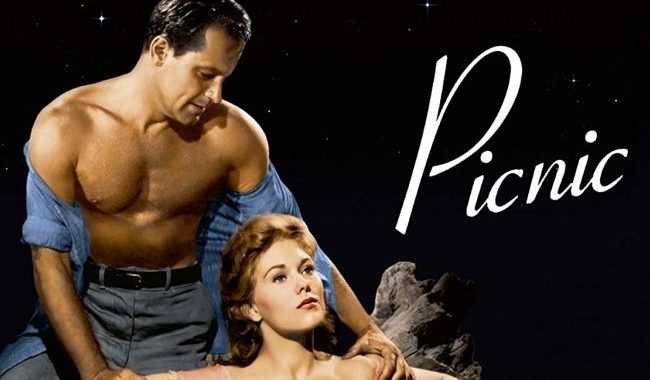
Picnic (1955) Blu-ray Review
 In the 1950s William Inge’s plays were bought up by Hollywood and made for good Cinemascope dramas. These included Come Back Little Sheba (1952), Picnic (1955), Bus Stop (1956) (in which Marilyn Monroe gave one of her best dramatic performances) and he also wrote the script for the steamy Splendor in the Grass (1961) starring Natalie Wood. Released by Eureka Entertainment in their Classics series is the Pullitzer Prize award winning Picnic (1955), a simple story given an epic look thanks to the location work and the Cinemascope camerawork. All of Inge’s plays focus on Mid-West folk and their lives.
In the 1950s William Inge’s plays were bought up by Hollywood and made for good Cinemascope dramas. These included Come Back Little Sheba (1952), Picnic (1955), Bus Stop (1956) (in which Marilyn Monroe gave one of her best dramatic performances) and he also wrote the script for the steamy Splendor in the Grass (1961) starring Natalie Wood. Released by Eureka Entertainment in their Classics series is the Pullitzer Prize award winning Picnic (1955), a simple story given an epic look thanks to the location work and the Cinemascope camerawork. All of Inge’s plays focus on Mid-West folk and their lives.
Like the other plays, Picnic is somewhat steamy with some supressed passion coming to the surface to create the drama. It opens with a train arriving at a Kansas railway station and apparent handsome beefcake hobo Hal Carter (William Holden), a former college football star arrives back to the town on Labour Day (September 5th). He goes to the home of the elderly Mrs. Potts (Verna Felton) and asks if she needs any work doing in the garden. She tells him it is Labour Day weekend and no one is working, but invites him in for breakfast. Later she meets the Owens family, teenage daughters Millie (Susan Strasberg) and the older Maggie (Kim Novak). He interjects when local paperboy and bigmouth starts hassling Owens to go out with him. He chases him off. He then meets up with his old friend, Alan (Cliff Robertson) who’s daddy owns the large grain elevators surrounding the town (“that’s a lot of biscuits” states Hal). Alan is glad to see Hal who tells him what he has been up to. Some of these seem like tall stories, but this is never made clear. Alan is also dating Maggie. Hal is invited to the Labour Day picnic by a nearby lake where once again Maggie will be crowned the Queen of Neewollah (bizarre – Halloween spelt backwards) complete with a cheap cape and cardboard crown. Emotions and passed enmities spill over in the evening when Hal slows dances (steamily) with Maggie. This scene is electrically charged and tips the film over to the emotions that now come to the surface. When Alan hears about this it angers the dullard, who has been going steady with Maggie, the younger immature jealous Millie and anger explodes from local frustrated schoolteacher Rosemary (a bitter performance from Rosalind Russell), all aided when her brow beaten boyfriend, Howard Bevans (a great performance by Arthur O’Connell) who has brought a flask of whiskey with him.

The release by Eureka looks lush with its Cinemascope, 2.55:1 aspect ratio made large by the final aerial shots of the flat Kansas landscapes. The film is a perfect evocation of life in the Mid West. This beefcake romantic hero as played by Holden at times seems a little simple and we don’t quite believe his tall tales of adventures with girls and his apparent failed Hollywood career. The real locations in Logan’s film (he also directed the Broadway version of the play) seem very real. This is not the apple pie America of the Andy Hardy films or Doris Day in On Moonlight Bay (1951) but something more real, prosaic and draws attention to the boredom of living in such isolated communities, as well as suppressed passions. It was filmed in Nickerson and nearby Hutchinson, Kansas for the grain elevators that still stand there today. This is also evident with the dysfunctional Owens family with Ma Owens (Betty Field) still bitter about her deadbeat husband walking out on her and the children years ago, leaving her to bring up the squabbling siblings on her own. Maggie Owens too has a look of ennui about her until Hal comes along who doesn’t offer her much other than passion and adventure.
The film looks good with one of the only other extra other than a trailer on the disc being a recent offscreen interview with Kim Novak in which she discusses the making of the film, her part in it and her working relationship with the volatile director Logan. Picnic was an early starring role for Novak, released within a month of her first leading role in the controversial drug film, The Man With the Golden Arm, in which she starred with Frank Sinatra.
Chris Hick
